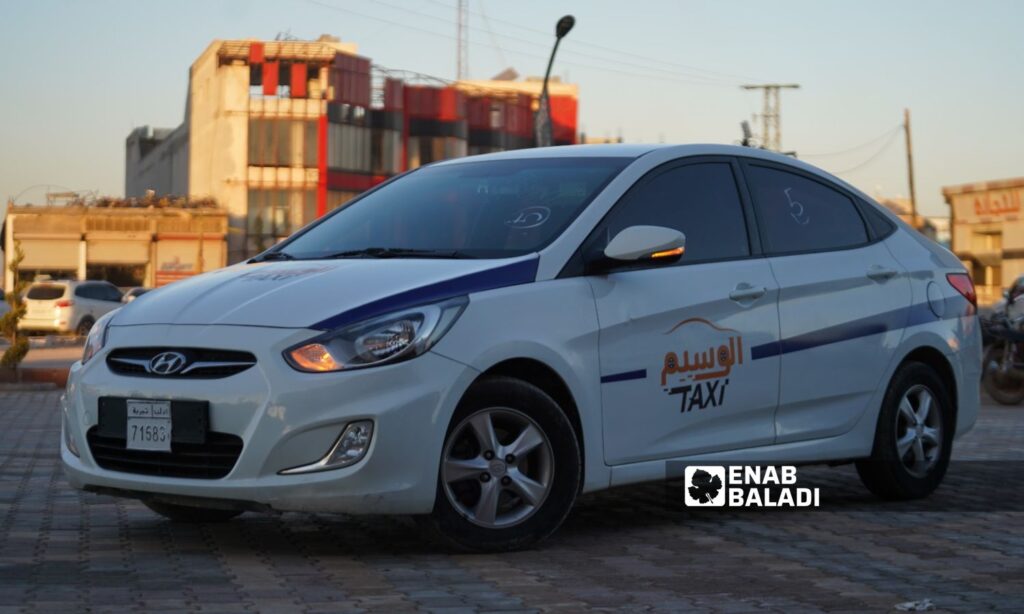A private company in Idlib governorate has launched a taxi service to facilitate transportation between the northern Syrian areas, with the feature of having female drivers.
The launch of the company’s services has sparked mixed reactions, with some seeing it as a positive step towards improving services in the region and providing employment opportunities for dozens of youth, while others viewed it as a mundane move that clashes with a struggling economic reality amid the availability of public cars and internal transportation means.
75 job opportunities
The company is named “Al-Waseem Taxi” and provides delivery services, with its main center in the city of al-Dana, northern Idlib.
The company’s CEO, Muhyiddin Mousalli, told Enab Baladi that the company provides job opportunities for more than 75 people, including drivers and administrative staff, and offers 25 Taxi cars scattered in designated parking lots.
The service is accessible to customers through communication via the WhatsApp application. The company’s cars are white in color, with some cars dedicated to women, driven by female drivers with a pink stripe covering the car.
Mousalli explained that the fares for car trips are half a US dollar for each kilometer (the dollar is equivalent to 30.4 Turkish lira), noting that the pricing is at the level of any public Taxi service.
He also pointed out that the company provides cars equipped with an electronic screen, meters, Wi-Fi 5 service, and GPS tracking service.
The company includes administrative departments, a customer service section (Call Center), a meeting hall, a monitoring and supervision section, and a finance director.
Mousalli believes that the community welcomes the idea of the company, considering it as providing good service to the area and comfortable transportation services for the customer.
Mixed opinions
Mohammed al-Basha, 32, from the city of Sarmada, northern Idlib, expressed his admiration for the launch of the service, stating that clearly specifying trip fares is a good thing as it allows the customer to consider the cost he will pay before requesting the service, unlike public taxis, in addition to the presence of female drivers.
On the other hand, Majd al-Shami, 42, residing in Idlib, considered that the company does not provide any new, unfamiliar services, as ordering Taxis via WhatsApp has become common.
He mentioned that public taxi drivers can be negotiated for fares, pointing out that using a taxi as a means of transportation for most people is for extreme necessity or in emergency situations due to the high fares compared to other transportation means.
Rami al-Ahmad, displaced from the countryside of Hama and residing in al-Dana, told Enab Baladi that he is trying to avoid riding minibusses when going to work in the city of Idlib in order to avoid the exhausting transportation fees.
He wondered in his conversation with Enab Baladi how he can ride a taxi when he is unable to secure the transportation fare in public transportation vehicles, adding that a taxi is a means rarely relied on by the locals.
Daily wages in the Idlib areas range from 60 to 100 Turkish lira (about three dollars), varying according to the number of working hours and the nature of the profession, whether agricultural, manual labor or construction.
Public transportation means (minibusses) in the city of Idlib – March 10, 2023 (Public Transport Corporation)
No impact on the job market
The repeated rise in fuel prices has negatively affected taxi fares, leading to a reduction in demand and a decline in its business.
Hassan al-Abdo, a taxi driver in Idlib, stated that he determines the fares of orders by agreeing with each customer individually, and they are set at the minimum limit to win customers, given the high number of working cars in the area.
He added that the opening of a private taxi company would not affect the already damaged job market due to the low demand and that specifying trip fares in dollars alienates customers and leads to repeated increases in transportation fares.
Imported diesel is sold at 1.078 dollars per liter (32.7 Turkish lira), recycled diesel at 0.689 dollars per liter, and gasoline at 1.279 dollars per liter.
Private taxi cars do not have a fixed fare, and the Transport Directorate affiliated with the Syrian Salvation Government (SSG) does not determine the fare for these cars. Instead, the fare is agreed upon between the driver and the customer and is linked to a prevailing tradition among car drivers, where the delivery fee for a distance of ten kilometers is no less than a hundred Turkish lira.
Various means of transportation are used by the residents in northern Syria, the most prominent of which is relying on motorcycles, which are a cheap means of transportation but do not meet all needs and are also hazardous in case of accidents.
The phenomenon of relying on strangers to reach the desired destination is widespread, posing risks to both the passengers and the drivers, on roads witnessing almost daily traffic accidents.

